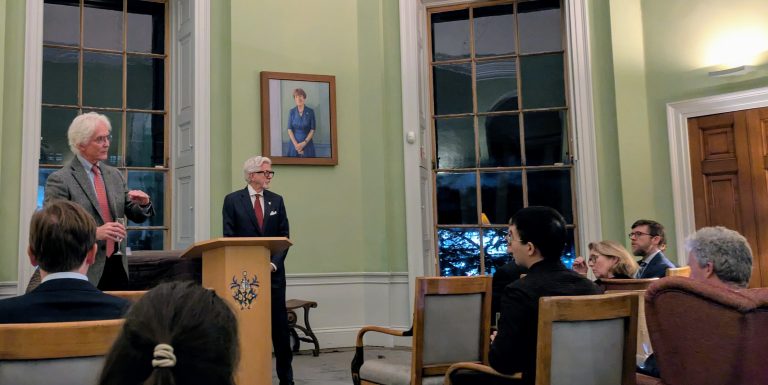Why ownership matters

On Thursday 23 January, Barclay Fellow Michael Cook and other members of the Green Templeton Principal’s Circle hosted James Bly (national practice leader of Ernst & Young LLP’s Family Enterprise Business Services) for dinner at the college. A small group of Green Templeton students were selected to join James and other guests for the private meal in the William Gibson Room, giving them the opportunity for an extended but relaxed and sociable conversation with a key figure in this area of business.
Before dinner, James gave a short talk in the Common Room on the vital economic and social role of larger multi-generational, family-owned businesses. Globally, he explained, family businesses represent a staggering 70% of GDP and employ around 60% of the workforce. James made the case for these businesses not just as employers and high performers, but also as community leaders and good business citizens, thinking in terms of long-term legacy rather than immediate gain. For these businesses, the effective management of generational transitions is essential, but many are unprepared, and things can go wrong as conflicts develop between generations, or between active and inactive owners and beneficiaries.
James, who has advised many generations of large family-owned businesses on these complex and sometimes volatile transitions, gave an overview of best practice – informed by his experience of passing on his own business to his son Chase, who was also present.
The discussion was organized and led by Michael, James and Green Templeton student Ken Deng (DPhil Finance, 2020) who explained that guest talked about ‘intergenerational succession experiences in family-owned businesses; the relationship between the founder family and local employment; the emerging risks to the traditions in a fast-changing world; and the potential of family office ”patient” capital relative to the private equity.’
He continued, ‘the knowledge about the topic of family ownership represented on that table was impressive. Students, myself included, could gain valuable insights into the sector from the questions, the personal stories, and the statistics.’

